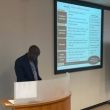Supporting innovation in emerging economies through Triple Helix Partnerships
“Being a chemical engineer and a scientific researcher it is of great importance to me to know the link between Government, the Business Community and Science and how it can be integrated for driving innovation.” according to Bashir Brika from Libya who joined MSM's executive program Building Triple Helix Partnerships which took place from 4 – 8 April 2022.
Innovation is at the heart of economic development. A business model innovation or a product innovation is at the core of any business. Innovation in big companies is mainly driven by R&D departments, but many Micro, Small and Medium Enterprises (MSME’s) cannot afford R&D units which are needed to grow. Therefore, alternative models to drive innovation are required. The triple helix partnership provides such a model. Mr. Julius Gatune Kariuki has developed this program to provide insights on how to set-up a triple helix partnership drawing from best practices and experiences.
Introduction to Triple Helix
After a warm welcome of Mr. Dorus Evekink, Program Manager of MSM’s private sector development programs, Mr. Julius Gatune Kariuki, Senior Project Consultant at MSM, explained the importance of the role of innovation and triple helix in Local Economic Development (LEDE) and gave insights into the typical characteristics of triple helix partnerships. This part of the program was a real eye opener for Mr. Brika: “As a researcher who is focusing on water resources, I have experienced many challenges because of the lack of cooperation between governmental authorities and the other two sectors (Academia and industry). The potential for innovation, (in my case the potential in the field of water, has been most valuable to me.”
Triple Helix Partnerships (THP) approaches
The participants learned about the key pre-requisites for setting up a Triple Helix partnership and gained a better understanding of the different arrangements. Mr. Gatune Kariuki shared some case studies and best practices from all over the world about how to apply triple helix partnerships to power agribusinesses. For Mr. Mohamed Said (Somalia) this part of the program in particular was very valuable: “Triple helix partnership implementation and building collaboration within the three sectors of THP was the most interesting topic for me as THP is very in need in our country to encourage starting innovation platforms where different sectors can collaborate together.”
Getting ready with the Triple Helix toolkit
Mr. Gatune Kariuki introduced the MSM Triple Helix toolkit, designed as a practical guide to help businesses to build, sustain and review triple helix partnerships. They explored the tools to assess Triple Helix Model readiness and strategies for improving readiness.
Implementing partnerships
Another important aspect is the process of setting up a triple helix partnership which starts with creating an implementation plan. In addition, they learned about the governance structure of triple helix partnerships.
Group assignments – a great experience
Throughout the week, the participants worked on various group assignments, putting theory directly into practice. Working in groups with people from so many different backgrounds and cultures has been an enriching experience for many participants: “The exposure to international perspectives, other viewpoints – business and cultural – was the greatest takeaway that even the content couldn’t top,” said Mr. Philipp Gröne (Germany).
Mr. Brika fully agrees: “Working on the group assignment enables me to examine topics from the perspectives of others.”
On the question why Mr. Gröne decided to join this program he said: “Innovation does not require a process but rather an environment where ideas and value can thrive. Getting a deeper understanding for Triple Helix Partnerships was for me a means to understand more about innovation and the global challenges we face. Mr. Gatune Kariuki was able to use his expertise and experience to guide us towards a better understanding of Triple Helix Partnerships.”
On this same question Mr. Said answered: “The reason for joining this program was to get a deep understanding about Triple helix partnerships regarding how they work and how the implementation of triple helix partnership can be done.”
Would you like to join the Building Triple Helix Partnerships program as well?
We plan to have another Building Triple Helix Partnerships program in the first half of next year. Please keep an eye on this page to find out when the next program will be scheduled. For more information, please contact Manon-Souren Huppertz (Senior Executive Education Officer)
About MSM’s executive education programs
Today’s rapidly changing societies and economies demand the most from organizations, leaders, managers and professionals. MSM’s Open Enrollment Executive Education programs for emerging markets are developed to achieve a successful and sustainable transformation of both individuals and organizations to support local economic development and business management.
Related news
Strengthening Private Sector Development in Emerging Economies
Developing your personal leadership style to influence with power

